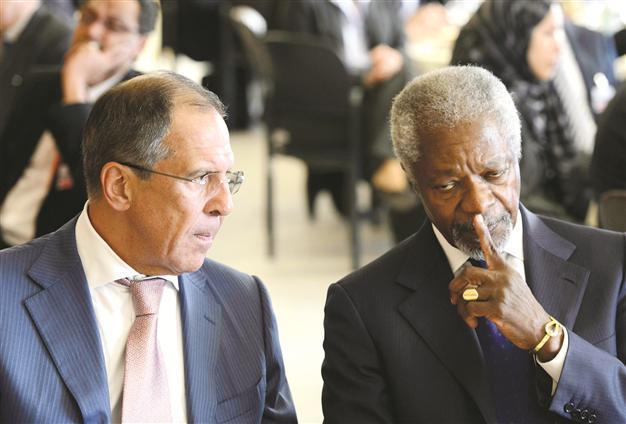UN to the West: Axis of Russia, China sees shift
GENEVA/ MOSCOW

Photo by Laurent Gillieron
There is a shift in
Russia and
China’s position on Syria that should not be underestimated, a spokesperson for envoy Kofi Annan said yesterday as Turkish Foreign Minister Ahmet Davutoğlu confirmed the change in the giants’ attitudes.
“Don’t underestimate the degree of a shift that happened particularly in the Russian and Chinese positions,” Ahmad Fawzi said following a weekend meeting Geneva.
“Russia and China have come to the conclusion that a change is necessary [in Syria’s administration],” Davutoğlu said.
According to Fawzi, reports out of Beijing and Moscow had been “very supportive” of the agreement made in Geneva. “Let’s wait until the dust settles on this agreement and I think everyone will see that it was quite an accomplishment that was achieved here on Saturday.”
Countries agreed in principle on a political transition, he said, but a complete halt to the violence was vital first.
“It’s imperative that we get a cease-fire,” said Fawzi.
Russia accuses West of distorting Geneva Syria accordShortly after Annan’s remarks, Russian Foreign Minister Sergei Lavrov accused the West of seeking to “distort” the agreement reached in Geneva.
Lavrov hailed the accord based on proposals by Annan as an “important step,” but said Western capitals had already read more into the final statement than what was written on paper.
“Unfortunately, some Western participants have started in public statements to distort the agreements that were reached [in Geneva],” he told reporters at a news conference with his Vietnamese counterpart.
“These [Geneva] agreements are not there to be interpreted. They mean exactly what is said in the communiqué and we need to follow the agreements that were made,” Lavrov said. “Our [Russian] position is honest and we are not trying to make it seem more than what is written in the text.”
World powers agreed June 30 on a plan for a transition in Syria which did not make an explicit call for President Bashar al-Assad to vacate his position of power. However, the West swiftly made it clear that it saw no role for al-Assad in a unity government.
“Neither al-Assad or anyone else, only the Syrian people, can decide who will govern Syria,” Davutoğlu said, adding that no authority could be above the will of the Syrian people. “In such a case, they can’t say the [Syrian] administration has been handed over to a transitional government.”
Lavrov also said he would meet Syrian opposition leaders in Moscow next week to discuss the possibility of ending violence in the country, Reuters reported. “We will use this coming meeting with yet another Syrian opposition group to continue work to end violence and start Syrian dialogue between the government and all groups of the Syrian opposition as soon as possible.”
Meanwhile, Lavrov blamed the Friends of Syrian People group for supporting “only one foreign rather than internal Syrian opposition group,” the Russian Foreign Ministry said on its Twitter account. He also said that the Friends of Syrian People group sought to fuel confrontation rather than foster conditions for a nationwide dialogue.
Turkey, UN,
